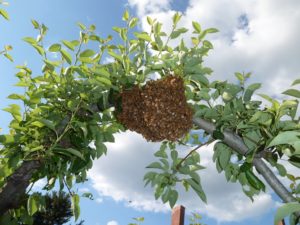Bee swarming is normal bee behavior. It’s the process in which the bees in one colonies decide to make two colonies. Without swarming, new bee colonies would never be created and bees would be doomed to perish.
Bees decide to swarm when their hive is congested or when the environmental conditions are just right. Long weeks of constant rain tend to get them in “swarming mood,” since the field bees remain in the hive so it feels like there are more bees around.
Once the bees decide to swarm, they start by making a new queen in special queen cells. The old queen stops laying (since her attendant bees stop feeding her as much), now her ovaries contract and she regains her ability to fly (albeit not as well as a worker bee).

About 8 days later, the future queen larvae (in the cells) become pupae and the hive swarms. Around 12-2pm on a nice day, all of a sudden many bees leave the hive. Finally the old queen joins them, typically settling on a nearby tree. All the bees surround her and protect her, that’s the well-known swarm pictures we have all seen.
The swarm sends out scout bees that look for potential new places to start a new colony. The scouts come back and use the familiar “bee dance” to point out where these places are. The swarm might move to one of these locations or just move a mile or so away, just to look elsewhere and keep its distance from the old hive.
Meanwhile, in the old hive, the queens hatch one-by-one. As the first of them comes out, it might decide to take another group of bees with her and go out on a smaller “after swarm,” or more likely, it might try to kill all the other queens, born or unborn, to become the only viable queen in the hive. Once that multi-queen situation is resolved and the queen only has one hive, it goes out on orientation flights and then its mating flight. New research shows that queens might mate with up to 50 drones. She then comes back to the hive, in a few days she’ll start laying eggs, just before the egg is laid it is fertilized by a little drop of sperm that the queen stores in her body for the rest of her life. She will never mate again, when she runs out of sperm the bees will make a new one as her replacement.
Bee swarms tend to be very gentle and not aggressive at all. If you see a swarm, call a local beekeeper who might be happy to collect it. Middlesex County Beekeeper Association has a swarm coordinator who helps connect unwanted swarms with enthusiastic beekeepers. And of course there’s me.
